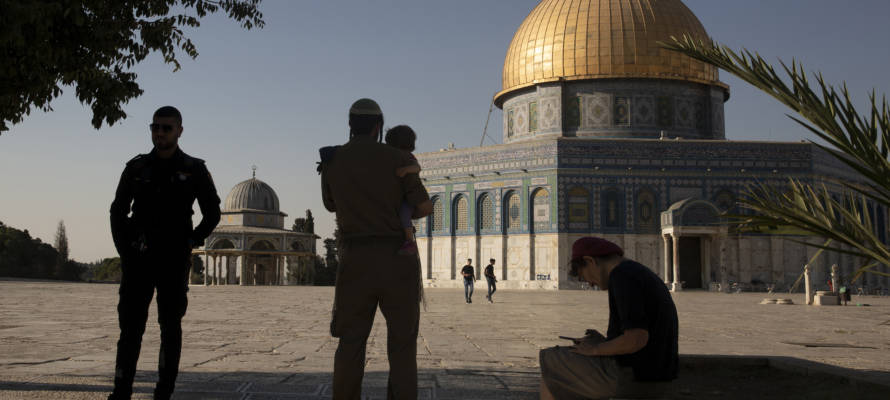The Jordanian Islamic endowment that maintains Al-Aqsa called the ruling a “flagrant violation” of the compound’s sanctity and a “clear provocation” for Muslims worldwide.
By Associated Press and United with Israel Staff
A ruling by a local Israeli court in favor of a Jewish man who prayed quietly at the Temple Mount in the Old City of Jerusalem has angered Muslim authorities, who denounced it on Thursday as a violation of the fragile status quo governing the compound.
The Temple Mount is the third holiest site in Islam and the holiest site for Jews, who refer to it as the Temple Mount because it was the location of the ancient Jewish Temples. It is the emotional epicenter of the Israeli-Palestinian conflict, and tensions there helped ignite the 11-day Gaza war in May. Under informal understandings, Jews are not allowed to pray there.
The ruling by a magistrate court in Jerusalem concerned a Jewish man who had been barred from the site for 15 days after Israeli police caught him quietly praying there. The court lifted the ban several days early, ruling that the man, “like many others, prays on a daily basis on the Temple Mount.”
Noting that he did so quietly and privately, the ruling said “this activity by itself is not enough to violate the police instructions.”
Magistrate courts make up the lowest level of the Israeli judiciary and hear cases concerning relatively minor crimes.
Under a longstanding but informal arrangement known as the status quo, Jews are allowed to visit the site but not pray there. The agreement has broken down in recent years as large groups of Jews, including religious nationalists, have regularly visited and prayed at the site. The Israeli government says it is committed to maintaining the status quo.
The Islamic endowment that maintains Al-Aqsa called the ruling a “flagrant violation” of the compound’s sanctity and a “clear provocation” for Muslims worldwide.
Member of Knesset Mansour Abbas, head of the Islamist Ra’am party, recently declared that Jews have no right to access the Temple Mount and that the Kotel, the Western Wall, also belongs to the Muslims.
Friday prayers at the mosque are regularly attended by tens of thousands of Palestinians, and are sometimes followed by violent protests and clashes with Israeli police, often due to incitement my Islamic preachers.
Israel liberated eastern Jerusalem — including the Old City and its holy sites sacred to Jews, Christians and Muslims — in the 1967 Six-Day War after it was occupied by Jordan since 1948, when the surrounding Arab countries attacked the fledgling Jewish state. Although Israel maintains security over the Temple Mount, it has allowed the Jordanian Waqf, or Islamic Trust, to administer the site.
“The Jordanian Foreign Ministry condemns the decision by the Israeli court allowing extremists to pray in the plazas of Al Aqsa Mosque,” the Ministry said in a statement, Arutz-7 reported.
Haitham Abu Al Foul, the Ministry’s official spokesperson, said, “This decision is worthless, and it has no legal standing under international law, which does not recognize the legal jurisdiction of Israel in territories occupied in 1967, including East Jerusalem.”
